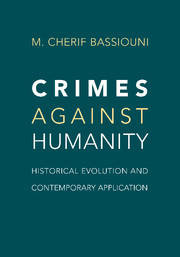Book contents
- Frontmatter
- Contents
- Preface
- Acknowledgments
- Table of Abbreviations
- Introduction
- 1 Legal Nature
- 2 Phenomenological Considerations
- 3 Emergence in Positive International Law
- 4 Post-Charter Developments
- 5 The Principles of Legality in the London Charter and Post-Charter Developments
- 6 Specific Contents
- 7 The Theories and Elements of Criminal Responsibility
- 8 Defenses and Exonerations
- 9 A Survey of National Legislation and Prosecutions for Crimes Against Humanity
- 10 Concluding Assessment: The Need for an International Convention
- Table of Authorities
- Table of Cases
- Index
- References
9 - A Survey of National Legislation and Prosecutions for Crimes Against Humanity
Published online by Cambridge University Press: 05 July 2011
- Frontmatter
- Contents
- Preface
- Acknowledgments
- Table of Abbreviations
- Introduction
- 1 Legal Nature
- 2 Phenomenological Considerations
- 3 Emergence in Positive International Law
- 4 Post-Charter Developments
- 5 The Principles of Legality in the London Charter and Post-Charter Developments
- 6 Specific Contents
- 7 The Theories and Elements of Criminal Responsibility
- 8 Defenses and Exonerations
- 9 A Survey of National Legislation and Prosecutions for Crimes Against Humanity
- 10 Concluding Assessment: The Need for an International Convention
- Table of Authorities
- Table of Cases
- Index
- References
Summary
Justice without force is impotent. Force without justice is tyrannical. Justice without force is infringed because there is always the mean. One must, therefore, combine justice and force, and, therefore, make strong what is right, and make right what is wrong.
– Blaise Pascal, The Provincial Letters (William F. Trotter trans., 1941).Introduction
The evolution of international humanitarian law and the international regulation of armed conflicts established individual criminal responsibility and the basis for national and international prosecutions. In the twentieth century, a journey began at Versailles in 1919 and ended in Rome on July 17, 1998, befittingly in the year of the fiftieth anniversary of both the Genocide Convention and the Universal Declaration of Human Rights. In Rome, a Diplomatic Conference for the Establishment of a permanent International Criminal Court (ICC) concluded its work with the adoption of a draft convention, which opened for signature on July 18 to all United Nations member states. One hundred thirty-nine states signed the treaty and, by August 2010, 113 states have become State Parties to the ICC. This three-quarter century pursuit of international criminal justice has been long and arduous, studded with terrible tragedies that ravaged the world, and too often this journey has been characterized by missed opportunities.
World War I was proclaimed “the war to end all wars” because it produced unprecedented victimization. Some 20 million people were killed, mostly combatants. World War II followed with all its horrors and devastation with more than 40 million dead, mostly noncombatants.
- Type
- Chapter
- Information
- Crimes against HumanityHistorical Evolution and Contemporary Application, pp. 649 - 723Publisher: Cambridge University PressPrint publication year: 2011



